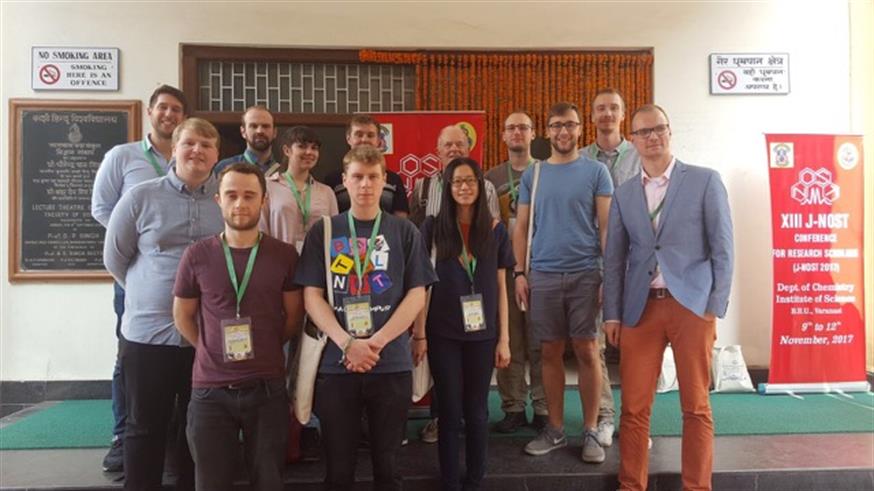
Jonny Pettinger (pictured above, third from right) at the 13th National Organic Symposium Trust Conference for Research Scholars.
Jonny Pettinger, a PhD student based in Professor Keith Jones' team in the Division of Cancer Therapeutics at The Institute of Cancer Research, London, was in Varanasi, India last month to speak at the 13th National Organic Symposium Trust Conference for Research Scholars.
He was one of just eight PhD students chosen from across the UK to speak at the four-day event, and was awarded a travel grant to do so by the Royal Society of Chemistry.
While in India, Jonny was also given the opportunity to spend two weeks at the Indian Institute of Chemical Technology (IICT) in Hyderabad, where he undertook a short research project in the lab of Dr Srivari Chandrasekhar.
Understanding cancer using an irreversible inhibitor
Jonny's talk at the conference was about his PhD research – on the design and synthesis of a molecule that could irreversibly block the activity of the protein HSP72.
HSP72 is one of a family of proteins that prevents cell death. It is often found at high levels in tumour cells, stopping the cells from dying when they should do.
Irreversibly inhibiting HSP72 could allow researchers to better understand the protein's role in cancer development, and could potentially make cancer cells more vulnerable to treatment.
Jonny's PhD research involved using the structure of HSP72 to develop a compound that irreversibly binds to a specific part of the protein, and could lead to a new way to design HSP72 chemical probes and drugs.
Professor Keith Jones’ Medicinal Chemistry Team is investigating the use of drugs that can selectively kill cancer cells by inhibiting specific pathways.
Find out more
Sharing research experience
The two-week research project was based on a PhD project being done in Dr Chandrasekhar's lab, involving developing an improved synthesis of a former drug candidate for insomnia, Almorexant.
Although it wasn't linked to his work with HSP72, the synthesis gave Jonny and the IICT team the chance to share their research experience with one another, particularly in the area of benzyne chemistry, which Dr Chandrasekhar's lab has significant expertise in.
Jonny said of his experience:
“I was delighted to be chosen to share my research at the conference, and to spend two weeks working at IICT. It was an excellent opportunity to learn from my fellow speakers, and the other researchers working in the lab.
“I definitely would encourage other chemistry PhD students to apply to take part in the next conference.”